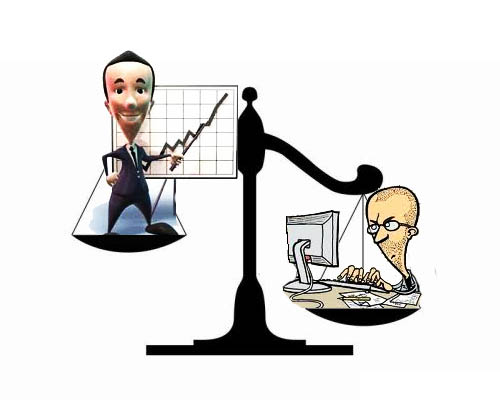Why you should not go to the managers

Small disclaimer
This article is not about food companies - it has its own specifics, I am writing only about the service. This article is not about big projects - a maximum of 6-7 people, on large ones everything is different.
Do you promise not to write in the comments that your company has overcome all these difficulties and there are no managers at all? Then welcome under the cat!
The pleasure of doing yourself
When I was small, I dreamed of making my own small car - to design, to go through each part with my hands, and then very, very much ride on it.
')
I didn’t collect the car, but I bought a 90's adult production bike, with which I spent a lot of fun hours from the bottom, not from the top, where the cyclist is supposed to be. The joy that I myself found the malfunction, repaired and now I can try my child on a local roller coaster, was indescribable.
Becoming a manager, forget this joy. You will communicate with the customer, scrupulously beat out the requirements with the help of a soldering iron and a Bulgarian saw - but to collect / repair a bicycle, let alone ride it, no one will give you - it is an unacceptable waste of time. The others will repair and ride yours, your team, and it is she who will get the sweetest piece of cake.
You no longer have to write yourself a beautiful custom controller or synchronize gigabyte data with the server in conditions of limited RAM. Not in this life.
The developer is much more in demand on the labor market
We all heard that a good programmer finds a job on the second day after being fired, and then only because the first day notes. This is exaggerated, but, in fact, true.
Experienced SSE (Senior Software Engineer) usually fits smoothly into any existing structure when compared to Formula 1 - it is much easier to find a mechanic who is well versed in aerodynamics than a car pilot who the whole team should adapt to.
Almost no one is looking for good managers, especially in large companies - everyone is looking for good specialists, and managers prefer to make their own.
Relevance of knowledge
No one needs a manager in a pure form - you need a person who is equally well versed in the technical part, and knows how to control himself and the team, communicate with people (his children, customers), write literate and beautiful text in correspondence.
Your technical knowledge quickly and hopelessly becomes obsolete, and absolutely no one needs you. Pure managers are in short supply both in the USA and in Europe, and they don’t pay us money for them - everyone wants to talk to a technical person, not a forwarder of letters.
Very soon after you stop programming 8 hours a day, you will notice that your subordinates, who only recently were younger and more inexperienced than you, begin to write more beautiful code, know more about the latest technologies and look at you a little awry. And there is no escape from this, and technical knowledge is now obtained at a very difficult price.
Not in a natural way, like a person who does this every day, but from two factors:
- Readings of technical literature, tracking on new technologies. But reading alone didn’t make a single person a programmer;
- 5% of programming that you sometimes can afford. It is very useful sometimes to fix a couple of bugs in a project, in the off-season (for example, when one project is over, and the other has not started yet) or the calm period is to take on a small, not very significant project for the company.
But no one obliges you to both of these things, they depend only on your willpower - and therefore it is immeasurably more difficult than when it is your main specialty. There will be no momentary, and even no quarterly result - you will just remain at least what you are.
But if you don’t do this, you risk turning into a glossy scrum- / agila- “manager with a laptop”, which gives the normal programmer emetic urges right to him on a little white shirt:

What is management?
No, of course I can not give a clear and unambiguous definition of this concept here. But I will try to pull a couple of phrases out of context.
When I was a junior developer, I dreamed of becoming a manager - it seemed to me that I would encode all the most interesting, set tasks for others and monitor their implementation. Such a position is really in some way, with its own, of course, nuances, but it is called a team, or a technical, or something else it will be called in another company.
The working day of the manager consists of:
- 5-20% of pre-sale. This is communication with new customers, processing of quotas, clarification of requirements for new projects.
- 40-70% of communication with customers. Comprehend and respond to dozens of letters that are not always adequate and come from competent people. Make calls, clarify requirements 10 times, rebuild deadlines, convince customers that this little modified design will shift deadlines ... what? Yes, of course, I know that the end-customer has a deadline and the budget is running out ... Our company? No, this is not a fakap, we are just always programmers and not wizards.
- 10-25% - communication with the team. Yes, this is probably the most pleasant time of the day.
Like? Welcome to Matrix, Neo. Are you already here?
I do not like? About this article.
PS By the way, if you add up the minimum percentages, you get 55%. Yes, it happens that the manager has nothing to do. But there are 115% and more - so everything is not as sweet as it may seem.
Source: https://habr.com/ru/post/148053/
All Articles